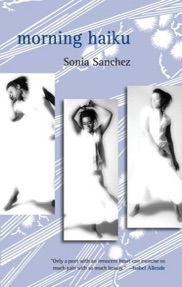My favorite genre of poetry is haiku. Not the strict adherence to a set number of syllables, the 5/7/5 we were taught in school; but the elegance of a distilled feeling or image. Their brevity invites breath in the reading and the reflection thereof. Haiku are shape-shifting moments of discovery or inspiration. Or homage, as in Sonia Sanchez's collection Morning Haiku, which celebrates and mourns Black musicians and singers, writers and artists, activists and leaders.
In the preface entitled “haikuography”, Sanchez tells of her awakening upon discovering the form when she was twenty-one. “This haiku, this tough form disguised in beauty and insight, is like the blues, for they both offer no solutions, only a pronouncement, a formal declaration—an acceptance of pain, humor, beauty and non-beauty, death and rebirth, surprise and life. Always life.”
Sanchez plays with the form, unfettered by syllabic count. Her haiku often appear in cycles, with each three-line haiku serving as a sort of stanza or musical movement in a longer piece.
In a December 2020 interview on The Poetry Magazine Podcast, Sanchez called haiku a “magical form” and the magic flows from her pen and her lips. For a treat, listen to Sanchez read, or rather perform, the first poem from Morning Haiku, “10 haiku (for Max Roach)”. Between her haiku movements, Sanchez vocalizes drum rhythms, scat-like, creating fusion with the jazz great:
2.
your sounds exploding
in the universe return
to earth in prayer
9.
your drums
soloing our breaths into
the beat…unbeaten
10.
your hands
simmering on the
legs of rain.
Another rhythm driven piece, “7 haiku (for Ray Brown)”, commemorates the African American jazz double bassist. Her beats reflect Brown's bop style and you hear his music in her words:
1.
African bass
translating our
beauty
2.
hammering
nails into the
off…beat…
3.
walking
our eyes on
water
4.
hands
violining us into
blue black waves
5.
ding ding ding (click)
dong dong dong dong dong (click)
dee boom (click) deeeboooom (click)
deeeee booooom (click)
Some of the poems resemble journal entries, as Sanchez captures the feelings from listening to music or viewing artworks. One such piece is “10 haiku (for Philadelphia Murals)”. It's as if Sanchez reached out and caught the essence of these public murals that reflect the culture of the city's neighborhoods. I see, having never seen, the murals through her eyes, her soul:
6.
winter
a warrior's face
i hear our bones singing
8.
common ground
is we, forever
breathing this earth
9.
hands
in the green light
saluting peace
She experiences the power of the painter/sculptor in “6 haiku (for Elizabeth Catlett in Cuernavaca)”:
2.
O how you
help us catch
each other's breath
3.
a woman's
arms climbing with
colored dreams
4.
Elizabeth
slides into the pool
hands kissing the water
5.
i pick
up your breath and
remember me
6.
your hands
humming hurricanes
of beauty.
Imagery returns to “hands” and “breath” often, appropriate as these are the tools of spoken word poets. We feel Sanchez take us by the hand, leading us to a memory that can take breath away or restore it.
The power of her breath and that of other activists is most pronounced in “9 haiku (for Freedom's Sisters)”. The explanatory notes, which give context for the writing inspiration and the lives being honored, tells us that Freedom's Sisters was an interactive, multimedia, touring exhibit that celebrated “twenty African American women who worked for the equality of people of color.” Each haiku is dedicated to a different woman, named at the top:
1.
(Kathleen Cleaver)
quicksilver
panther woman speaking
in thunder
3.
(Shirley Chisholm)
We saw your
woman sound footprinting
congressional hallways
5.
(Fannie Lou Hamer)
feet deep
in cotton you shifted
the country's eyes
7.
(Rosa Parks)
baptizer of
morning light walking us away
from reserved spaces
9.
(Dr. Dorothy Irene Height)
I
your words
helped us reconnoiter
the wonder of women
II
woman sequestered
in the hurricane
of herstory…
A number of poems do not refer to other artists or activists. These haiku capture moments of dance, love, and the poet's memories. “Memory haiku” begins:
1.
i was born
a three-legged
black child
2.
carrying an
extra leg for quick
departures.
The collection culminates in “haiku poem: 1 year after 9/11”. Comprised of twenty-eight spare couplets that are all questions, this apt ending ponders the tragedy, the continuance of hatred in the world, and what will come next. A reminder that the work is not done:
How hard must the wind
blow to open our hearts?
How to live—How to live
without contraband blood?
Do the stars genuflect
with pity for everyone?
Breathe in the beauty and power of Sanchez's words. Breathe out a dedication to honoring the poet and all the lives that bring art, music, literature, and equality to the world.
Purchase Morning Haiku here.
Podcast with Sonia Sanchez
Diane Englert is a writer, actor, accessibility consultant and provider. She writes for the website Write or Die Tribe and her work also appears in Ruminate Magazine, From the Depths, What Rough Beast, and We’ll Never Have Paris. She wrote libretto for several mini musicals that were all produced. Diane has a BFA in theater from University of Utah and an MBA from Marylhurst University.
Sonia Sanchez's
Morning Haiku
Celebrates Black Lives
Book Review
by Diane Englert
